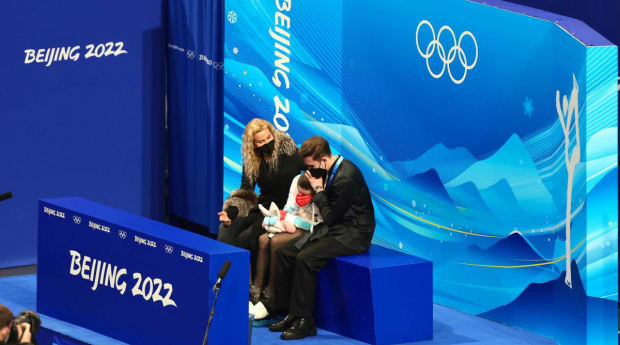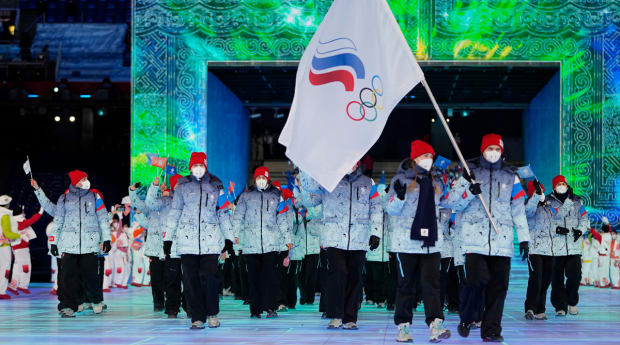With the looming threat to invade Ukraine and the specter of another doping scandal, one country continues to be at the center of Olympic dysfunction.
BEIJING — In the first period of the gold-medal men’s hockey game, Finland’s Hannes Björninen high-sticked Russian Olympic Committee’s Egor Yakovlev, and the Russians responded with a power-play goal. It was so nice to see Russia make somebody pay for breaking a rule.
Finland won the game, but Russia was the story of yet another Olympics. The Russians finished second in the medal count here, behind Norway; imagine what they’ll do when they are actually allowed to participate.
That happens in Paris in 2024, by the way. The IOC’s Russia problem has never gone away. It just keeps getting bigger.
Russia was originally banned from the Olympics for a massive state-sponsored doping program, but of course the IOC backed down and reduced the sanctions. The conversation went something like this:
“OK, fine. You can compete. You can win medals. You can go back home and be heroes to your people.”
“Great!”
“But we have one condition.”
“Yes?”
“We get to hold your flag.”
“LOL!”
There were no great answers to the Russia problem—banning a country is a sweeping measure that inevitably penalizes some people who didn’t do anything wrong. But what did the IOC really accomplish with its faux ban? Russia is winning medals at basically the same pace it did in 2014, when its state-sponsored doping took place. Russian president Vladimir Putin has acknowledged that the doping happened but denied it was state-sponsored: “It has never been so and will never be so," he said in 2018.
Putin also said then: “The work on the fight against doping has been enormous, but the problem is not solved completely. … We must be thinking not only about results, which are interesting and important, but about the health of our athletes as well.”

Simon Bruty/Sports Illustrated
Yeah, well, about that: The entire sad Olympics story of 15-year-old Kamila Valieva calls into question whether Russia cares about the health of its athletes. Valieva took a drug test in December. The sample was not run until February. She tested positive for trimetazidine, a banned heart medication. The Russian Anti-Doping Agency (RUSADA) banned and quickly un-banned Valieva from competing. The pressure broke her during the women's free skate Thursday, at which point her controversial coach, Eteri Tutberidze, chastised her.
Most of the conversation has been about Tutberidze and that reaction. IOC president Thomas Bach said Friday that it was “chilling” how Valieva’s “entourage” treated her. He also sounded open to closing the “protected persons” loophole that allowed a 15-year-old to compete despite taking drugs that would have gotten anybody else banned. Bach also argued that the IOC tried to keep Valieva out of the individual competition, but the Court of Arbitration for Sport ruled that she was eligible, and the IOC had to respect the decision.
What happened to Valieva is heartbreaking, but it is also illustrative. Where was RUSADA’s interest in the health of Russian athletes? Why didn’t RUSADA test her sample in a timely fashion? Where was Russia’s national concern for fair play? It was clear that Valieva’s fellow skaters did not buy the official explanation for her positive test, which was that she ingested something that was contaminated by her grandfather’s medication. Russia went out of its way to find a path for her to participate. Why would athletes competing in any sport here assume their Russian rivals are clean?
Meanwhile, Putin has now spent three of the last eight Olympic Games either invading a country or coming awfully close to doing so. In 2008, Russia invaded Georgia. In 2014, it annexed the Crimean Peninsula of Ukraine. For the last two weeks, Russia has lined troops along the Ukrainian border.

Jae C. Hong/AP
The timing is probably coincidental. It is hard to believe Putin thinks the world will let him invade a country because it is so distracted by the bobsled, or if you prefer: the bobsleigh. It is even harder to believe he is invading countries as a way to distract people from the bobsled, or if you prefer: the bobsleigh. This does not bode well for my book proposal, “The Art of War During Bobsled/Bobsleigh.”
Russia’s military actions and threats have added a layer of nervousness, awkwardness and fear to the Olympics. Ukrainian athletes competing here had no idea if they would go home to a country at war. The head of the National Olympic Committee of Ukraine is Sergey Bubka, who won Olympic gold in the pole vault while competing for the Soviet Union in 1988. He might have won another, but the USSR boycotted the 1984 Olympics in Los Angeles in retaliation for the U.S. boycott of the 1980 Olympics in Moscow. The fact remains: Russia has been at the center of Olympic dysfunction for more than two generations.
Bach obviously can’t do anything about Putin’s foreign policy, but he faces a real quandary in figuring out how, and how much, Russia should be allowed to participate in the Olympics. Actually banning all of the country’s athletes for the Valieva episode might be extreme. But if he lets Russia do as it pleases again, that would be chilling.
More Winter Olympics Coverage: